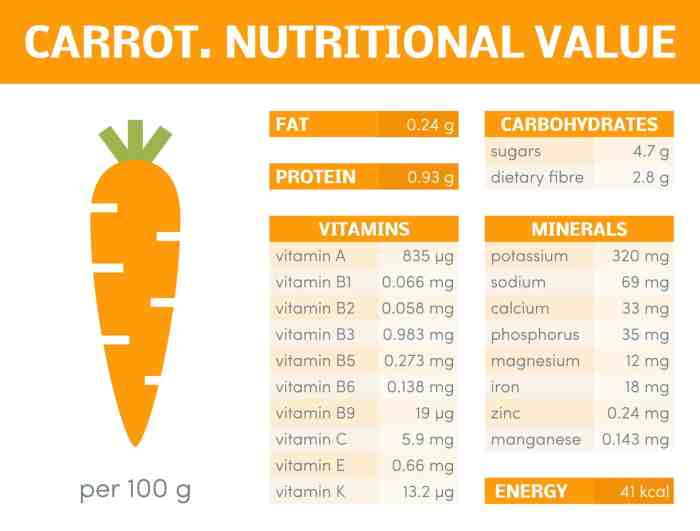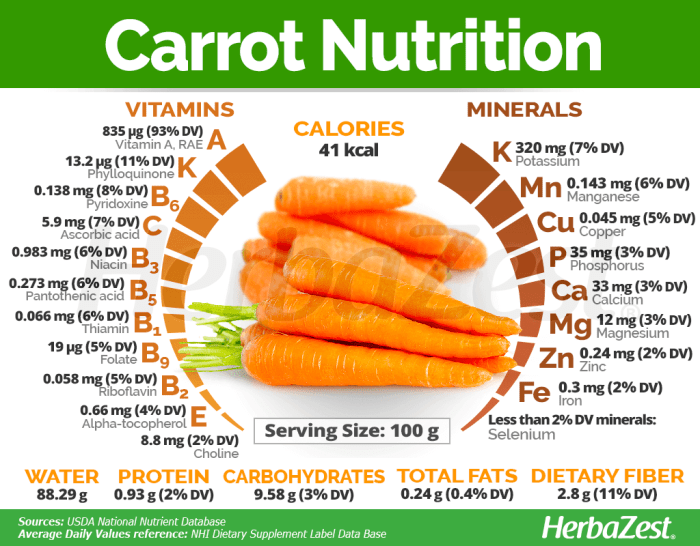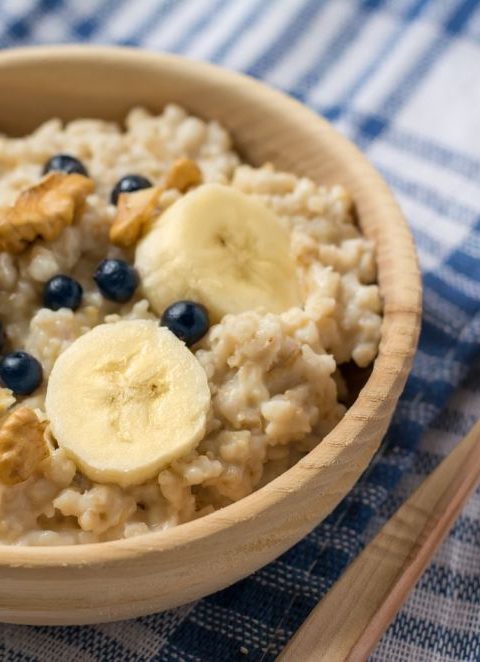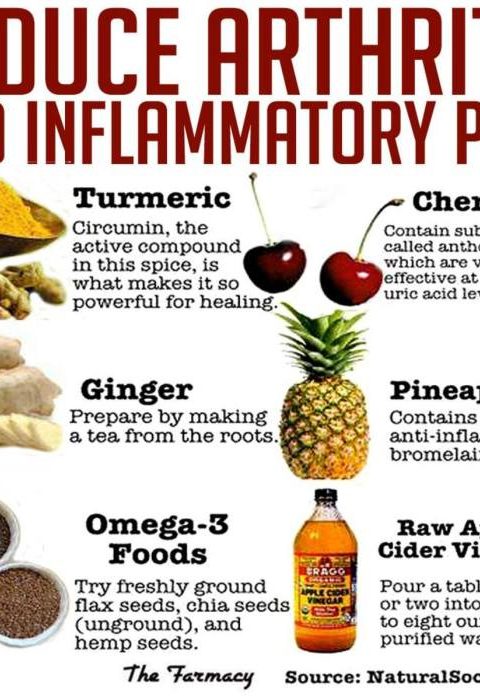Nutritional Composition of Carrots
Nutrition facts for a carrot – Carrots are a versatile and nutritious root vegetable, offering a wide array of health benefits thanks to their rich composition of vitamins, minerals, and fiber. Understanding their nutritional profile can help us appreciate their role in a balanced diet. This section details the macronutrient and micronutrient content of carrots, along with the significance of their fiber content.
Macronutrient Composition of Carrots
Carrots are primarily a source of carbohydrates, providing energy for the body. They contain relatively low amounts of protein and fat. The following table provides a detailed breakdown of the macronutrient content per 100g serving:
| Nutrient | Amount per 100g | % Daily Value | Unit |
|---|---|---|---|
| Carbohydrates | 9.6g | ~3% | grams |
| Protein | 0.9g | ~2% | grams |
| Fat | 0.2g | ~0% | grams |
Note
Daily Value percentages are approximate and can vary based on individual dietary needs and calorie requirements.*
Micronutrient Profile of Carrots
Carrots are an excellent source of various micronutrients vital for maintaining good health. These contribute to various bodily functions and overall well-being.
A single carrot offers a decent amount of Vitamin A and fiber, contributing to overall health. However, for a quicker, more readily absorbed electrolyte boost, you might consider checking out the detailed liquid i.v. nutrition facts to compare its nutritional profile. Ultimately, both carrots and electrolyte drinks can play a role in maintaining hydration and providing essential nutrients, though they differ significantly in their delivery method and nutrient composition.
The following micronutrients are particularly abundant in carrots:
- Vitamin A (Beta-Carotene): Crucial for vision, immune function, and cell growth. Beta-carotene is a precursor to Vitamin A, meaning the body converts it as needed. A deficiency can lead to night blindness and impaired immune function.
- Vitamin K1: Essential for blood clotting and bone health. Adequate Vitamin K intake is vital for preventing excessive bleeding and maintaining strong bones.
- Vitamin C: A powerful antioxidant that protects cells from damage, supports the immune system, and aids in collagen production for healthy skin and tissues. Deficiency can lead to scurvy.
- Potassium: An important electrolyte that regulates fluid balance, blood pressure, and muscle contractions. Adequate potassium intake is associated with lower blood pressure and reduced risk of stroke.
- Biotin: Important for metabolism of carbohydrates, fats, and proteins. It also plays a role in cell growth and development.
- Manganese: A trace mineral involved in bone formation, wound healing, and metabolism. It is also an antioxidant.
Fiber Content and Digestive Impact of Carrots
Carrots are a good source of dietary fiber, primarily insoluble fiber. Insoluble fiber adds bulk to the stool, promoting regular bowel movements and preventing constipation. It also helps maintain a healthy gut microbiome by providing nourishment for beneficial gut bacteria. The fiber content contributes to feelings of fullness, aiding in weight management. A typical 100g serving of carrots contains approximately 2.8g of fiber.
Regular consumption of fiber-rich foods like carrots can significantly improve digestive health and reduce the risk of digestive disorders.
Health Benefits Associated with Carrot Consumption: Nutrition Facts For A Carrot

Carrots offer a wealth of health benefits, primarily attributed to their rich nutritional profile. Beyond the readily apparent sweetness and crunch, lies a powerhouse of vitamins, minerals, and antioxidants that contribute significantly to overall well-being. This section will delve into the specific health advantages associated with regular carrot consumption.
Beta-Carotene and Vitamin A’s Role in Vision
Carrots are exceptionally rich in beta-carotene, a carotenoid pigment that gives them their vibrant orange color. Our bodies efficiently convert beta-carotene into Vitamin A, a crucial nutrient for maintaining good vision. Vitamin A is essential for the formation of rhodopsin, a light-sensitive pigment in the retina responsible for night vision. A deficiency in Vitamin A can lead to night blindness and, in severe cases, even irreversible damage to the eyes.
Regular consumption of carrots helps ensure adequate Vitamin A levels, supporting healthy vision throughout life. This is especially important for maintaining optimal eye health as we age.
Antioxidant Properties and Chronic Disease Prevention
Carrots possess significant antioxidant properties, largely due to their high concentration of beta-carotene and other carotenoids like lutein and zeaxanthin. Antioxidants combat free radicals, unstable molecules that can damage cells and contribute to the development of chronic diseases like heart disease, cancer, and Alzheimer’s disease. The antioxidants in carrots help neutralize these free radicals, protecting cells from oxidative stress and reducing the risk of these chronic conditions.
Studies have shown a correlation between increased consumption of fruits and vegetables rich in antioxidants, like carrots, and a lower incidence of certain cancers.
Carrot Consumption and Immune Function, Nutrition facts for a carrot
Carrots contribute to a robust immune system through their diverse nutrient composition. Beyond Vitamin A, they are a good source of Vitamin C, another powerful antioxidant crucial for immune function. Furthermore, carrots contain various phytochemicals, bioactive compounds that possess anti-inflammatory and immune-modulating properties. These compounds help support the body’s natural defenses against infections and illnesses. A diet rich in fruits and vegetables, including carrots, is generally associated with a stronger immune response and reduced susceptibility to infections.
Carrots in Different Culinary Preparations

Carrots, a versatile root vegetable, offer a delightful spectrum of culinary possibilities beyond simple snacking. Their naturally sweet flavor and firm texture lend themselves to a wide array of cooking methods and dishes, enhancing both taste and nutritional value. Exploring diverse preparations unlocks the full potential of this humble yet powerful vegetable.
A Carrot and Ginger Soup Recipe
This vibrant and flavorful soup is a perfect example of how to showcase carrots in a healthy and appetizing dish. The combination of carrots and ginger creates a warming and subtly sweet taste, complemented by the richness of coconut milk.
Ingredients:
- 1 tablespoon olive oil
- 1 medium onion, chopped
- 2 cloves garlic, minced
- 1 inch ginger, grated
- 1 pound carrots, peeled and chopped
- 4 cups vegetable broth
- 1 can (13.5 ounces) full-fat coconut milk
- Salt and pepper to taste
- Optional garnish: fresh cilantro, a squeeze of lime
Instructions:
- Heat olive oil in a large pot over medium heat. Add onion and cook until softened, about 5 minutes.
- Add garlic and ginger and cook for another minute until fragrant.
- Stir in carrots and vegetable broth. Bring to a boil, then reduce heat and simmer for 15-20 minutes, or until carrots are tender.
- Carefully transfer the soup to a blender (or use an immersion blender) and blend until smooth.
- Stir in coconut milk and season with salt and pepper to taste.
- Serve hot, garnished with fresh cilantro and a squeeze of lime, if desired.
Nutritional Profile (per serving, approximate):
This recipe provides a good source of Vitamin A (from beta-carotene), fiber, and potassium. The coconut milk adds healthy fats. The exact nutritional profile will vary depending on the specific ingredients used and serving size. A single serving is likely to provide around 200-250 calories, depending on portion size.
Nutritional Comparison: Raw vs. Cooked Carrots
Cooking carrots can alter their nutritional composition slightly. While some nutrients may be lost during the cooking process, others may become more bioavailable.
| Raw Carrots | Cooked Carrots |
|---|---|
| Higher in Vitamin C | Higher bioavailability of beta-carotene (Vitamin A) |
| Crisper texture | Softer texture, easier to digest |
| May contain slightly more fiber (depending on cooking method) | May contain slightly less fiber (depending on cooking method, some fiber may leach into cooking water) |
Note: The extent of nutrient loss during cooking depends on factors like cooking method (boiling vs. steaming), cooking time, and water usage. Steaming generally preserves more nutrients than boiling.
Creative Carrot Incorporations
Carrots can be seamlessly integrated into a wide variety of dishes, adding both nutritional value and visual appeal.
Here are several creative ways to incorporate carrots into your meals:
- Salads: Add shredded or julienned carrots to your favorite salads for a crunchy texture and added sweetness.
- Soups: Carrots are a staple in many soups, adding both flavor and nutrients. They work particularly well in creamy soups or vegetable broths.
- Juices: Carrot juice is a popular and healthy beverage, often combined with other fruits and vegetables for a balanced nutritional profile.
- Stir-fries: Add sliced or diced carrots to stir-fries for a vibrant color and a slightly sweet counterpoint to savory flavors.
- Baked goods: Grated carrots can be incorporated into muffins, cakes, and breads, adding moisture and a subtle sweetness.
- Roasted vegetables: Roasting carrots brings out their natural sweetness and creates a tender, slightly caramelized texture.
Key Questions Answered
Are carrots good for weight loss?
Carrots are low in calories and high in fiber, which can promote feelings of fullness and aid in weight management. However, they should be part of a balanced diet and exercise plan for effective weight loss.
Can I eat too many carrots?
Consuming excessive amounts of carrots can lead to carotenemia, a harmless condition causing a yellowish tinge to the skin. Moderation is key.
How should I store carrots to preserve their nutrients?
Store carrots in a cool, dark, and dry place. Refrigerating them in a plastic bag can help maintain freshness and prevent wilting.
Are baby carrots as nutritious as larger carrots?
Nutritionally, baby carrots and larger carrots are quite similar. However, baby carrots often undergo processing which might slightly alter their nutrient content.




